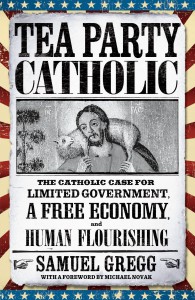 Giovanni Patriarca recently sat down with Acton Research director, Samuel Gregg, to discuss his latest book, Tea Party Catholic. Patriarca, Acton’s 2012 Novak Award winner, began by asking Gregg what the “most alarming and peculiar aspects” are of America losing its “historical memory” and running the “risk of deconstruction of its own identity.”
Giovanni Patriarca recently sat down with Acton Research director, Samuel Gregg, to discuss his latest book, Tea Party Catholic. Patriarca, Acton’s 2012 Novak Award winner, began by asking Gregg what the “most alarming and peculiar aspects” are of America losing its “historical memory” and running the “risk of deconstruction of its own identity.”
The American Founding was certainly influenced by certain streams of Enlightenment thought, not all of which (such as social contract theory) are compatible with Catholic faith. Yet as figures ranging from Alexis de Tocqueville to Pope Emeritus Benedict XVI have observed, the same Founding was also shaped by a broadly Christian (mainly Protestant) culture and various versions of natural law thinking with which it is possible for Catholicism to converse. Was the American Founding perfect? Of course not! It was as much a creation of fallible human beings as any other political society. But as both Tocqueville and Benedict observed, the American Experiment has provided ways of reconciling, among other things, religious faith and liberty in a manner that many European countries simply failed – and in some cases – still fail to do. If, however, Americans lose sight of this inheritance of ideas and institutions, it is hard to see how the American Experiment, which represents a distillation of the broader tradition of what I unapologetically call the civilization of the West, can survive.
The book offers the philosophical contributions of John Finnis, German Grisez, Joseph Boyle, and Robert George. Patriarca asked Gregg to explain “the main points of these outstanding thinkers for contemporary philosophical debate.”
I especially think that the new natural lawyers’ presentation of how human beings flourish and the role played by the workings of free choice in that regard has been very influential in shaping many young Catholic clergy, intellectuals, and laypeople, but also a good number of people outside the Church, including some non-Christians. It’s true, of course, that new natural law theory has its critics, including some perfectly orthodox Catholics who also work in the natural law tradition. But this has at least facilitated some very good and constructive debates about natural law inside and outside the Church that are much harder to find in continental Western Europe.
Patriarca asked about the influence of Charles Carroll. He points out that Carroll, the only Catholic who signed the Declaration of Independence is often quoted in Tea Party Catholic, Patriarca asked Gregg “what can be said to better understand this figure?”
Apart from being one of the best educated of America’s Founders, Charles Carroll is especially important because he combined deep attachment to the truth of the Catholic Faith, with a profound commitment the movement for liberty and constitutionally limited government that was so central to the American Revolution. This was despite the enormous prejudice that existed against Catholics in the overwhelmingly Protestant American colonies—so much so that Carroll and his family were subject to many penal laws in the colony of Maryland (which, ironically, had been founded by English Catholics!) because of their Catholicism.
He concluded with this question, “Catholic Social Teaching considers creativity, responsibility and a respectful freedom as milestones of a flourishing society. How can they be developed in a contest apparently indifferent to any call of conscience?”
These ideas are central to the entire Catholic tradition of moral reasoning. This soon becomes apparent to anyone who has read the Gospels and who has some familiarity with the Doctors and Fathers of the Church, papal magisterial teaching, and the teachings of all the ecumenical councils, including all the documents promulgated by Vatican II. Moreover, it’s only in light of the truths revealed by all these teachings and natural reason that a Catholic can form their conscience. Once Catholics understand this as the correct understanding of conscience, then the falsity of the emotivist, relativist and frankly incoherent conceptions of conscience articulated by most secularists and, alas, some Catholics, becomes glaringly apparent.
And this matters for free societies, because unless we believe that (1) all people can know the truth about good and evil, (2) that the truth is not whatever we “feel” it to be, and (3) that conscience’s force arises from its grounding in knowledge of the truth about God and Man, then it becomes very difficult to sustain freedom. Instead we experience what Pope Francis called very early in his pontificate the profound spiritual poverty of relativism, and what his predecessor called the dictatorship of relativism. In these situations, freedom simply degenerates into license, governments consider themselves free to pass laws that are subversive of a healthy moral ecology, and justice becomes whatever the strongest person or group wants it to be.
Read the entire interview over at Zenit or learn more about Tea Party Catholic by visiting the book’s website.

